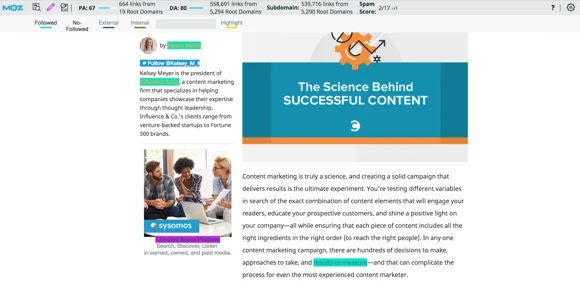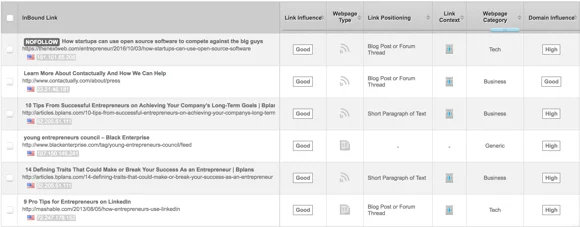
How to Use Guest Posting to Effectively Boost Your SEO
How to Use Guest Posting to Effectively Boost Your SEO
Alyssa Patzius, Vice President of Sales • Intero Digital • November 14, 2017
Strong SEO requires strong content, and one of the best ways to boost your SEO is to extend your content’s reach by contributing to high-authority sites.
Guest posting in outside online publications allows you to expand your horizons, reach new audiences, and engage with them on platforms they trust — but you can’t push your content out to every site you can find and expect to land on Page 1. Your SEO strategy is as important as your approach to content marketing, and to maximize the ROI you get from both, you’ve got to do a little research.
Research Publications' Domain Authority and Relevancy
If you’re an expert in the marketing industry, it won’t be very helpful to pitch editors at publications about, say, cooking. Not only would it be pretty much impossible to contribute content that far off-topic, but even if you did manage to publish there, those links from irrelevant sites wouldn’t help you achieve long-term SEO benefits.
(I know that sounds simple, but I bet you could ask just about any publication editor and she’d have a story for you about the most recent time someone tried shopping around a totally random article that had no place on her site.)
The publications you target should be reputable authorities within your industry, not spammy content farms. A good rule of thumb about whether a site is authoritative enough is to ask yourself whether you’d be comfortable sharing an article from this publication with your friends and professional connections on social media. If not, keep looking.
Identify Guidelines on Backlinks for Guest Posts
Tools like MozBar can give you access to link metrics that will show you pretty quickly which links in an article are follow or nofollow and internal or external.

While follow links that carry link juice through sites into new sites are strongly encouraged to build SEO, you won’t be doomed to complete failure if a site doesn’t allow them; you can still gain valuable organic referral traffic to generate leads.
Be sure to check that contextual links in the body of your guest post are allowed, too. (Tools like cognitiveSEO can help.) Contextual links in the right publications carry more of that link juice than links in bios or footer links, for example, so they play a big role in your SEO efforts. They help Google establish a relevancy factor, and they can also boost CTR and create a better user experience by providing readers with additional valuable information.

It should go without saying, but I’ll repeat it once more for the people in the back: If you’re writing and linking purely for SEO benefits and not to provide value to your actual audience, you’re going to have a bad time. The key is to write for humans and optimize for search — which leads me to my next point.
On-Page Optimization Factors You Can't Afford to Overlook
Once you’ve done your publication research, it’s time to create and optimize your content for contribution. Guest posting is very different from writing content for your own blog, but there are still SEO factors in any piece of content that you can’t afford to ignore:
- Title Tags: Don’t stuff keywords in the title tag, which, for guest posts, should be the title of the article. Use keywords or keyword phrases that naturally fit users’ search intention to avoid penalty.Try using long-tail keywords, as opposed to your main keyword, in the title tag to ensure it’s unique compared to competitors. And, if possible, place it toward the beginning of the title. Remember, it’s best to keep titles right around 60 characters so they appear in full on SERPs, but it never hurts to check the actual SERP display before sending the content to an editor.
- Headings (H1): Include an H1 tag on every article — not just bigger or bolded fonts. You can include an exact or partial match of your target keyword in the heading, but it has to make sense to your readers and support the actual content in that section. And avoid duplicate titles and headers; H1 should not be the same as the title tag.I like to think of H1 as your book title and H2 as chapter titles; you only get one title, but you can break up your book into as many chapters as you need to make it easier to consume.
- Content on the Page: Always shoot for creating comprehensive, informative content that’s original, helpful, and relevant to the user’s search intention. Avoid keyword stuffing, and use online tools to make sure you’re not overusing certain keywords.You’ll also want to target different primary keywords per article; targeting the same keyword in multiple articles will trigger keyword cannibalization, and you don’t want to make Google guess which page should rank for which keyword.
- Image Alt Tags: Content with image alt tags tends to rank better, so it’s best to include them whenever possible. Once again, though, avoid stuffing keywords in alt tags. If you can’t think of a keyword for an image alt tag, you should probably find a different image that better describes the content’s message.
- Other Factors: Meta descriptions of each article that include the target keyword or keyword phrase can help boost SEO. So can factors like page-load time and mobile-friendliness, but as a guest contributor, those are out of your control.What’s still in your control, though, is content quality. SEO doesn’t depend solely on how well you write your article, and tools like SEMrush, cognitiveSEO, Google Analytics, and Moz can help you perform keyword research, analyze article performance, and examine link quality to get the most out of each article.
Be Our Guest (Content): The Welcome Benefits of Guest Posting
If it seems like a lot of work to craft optimized guest content, that’s because it is. But it’s also very much worth the effort because the SEO benefits of guest posting can affect your entire strategy.
1. Natural Backlinks
The first major benefit is natural backlinks to your site from reputable, high-authority publications. Google is always updating its algorithm and often punishes marketers who use shady tricks for short-term benefits. Done correctly, guest blogging is a long-term strategy that will continue to boost your search visibility over time.
Google takes backlinking into consideration for rankings, and even one contextual link from a highly regarded publication can be worth more than 10 links from lower-quality sites. Remember that the link itself and the anchor text should support the context of that guest post and a healthy link portfolio should contain a variety of types of anchor text.

2. Valuable Brand Exposure
High-authority publications have a lot of power in the SEO world (and the world of content), and guest contributing can provide valuable brand exposure. By getting your expert insights into leading online publications your audience already trusts and engages with, you’re positioning your brand right alongside them.
It’s important to remember, though, that guest posts aren’t link-building farms. Although it might be tempting, overoptimizing your content will only cause Google to punish you by devaluing the SEO juice coming from that backlink. It’s far more effective to create informative, optimized content for the right publications because it establishes you as a thought leader and provides valuable opportunities to connect and engage with your audience.
3. Long-Term Domain Authority
If your content is regularly seen in highly regarded publications, you’ll be seen as an expert in your industry — but the benefits extend past your thought leader’s brand and affect the authority of your company, too. Educational assets that you link to in your guest posts can give you high-quality links from reputable sites, which increases your site’s domain authority.
That last part — “reputable sites” — is the key. Contributing posts to spammy websites just for the links will only come back to bite you in the long run, so it’s best to put in the work of targeting publications with active, engaged audiences who are interested in what you have to say.
You can even use tools such as Moz or cognitiveSEO to determine whether a link is considered a “good influence” or “no influence” to your overall domain authority, which will keep you from wasting your time.

Guest-contributed content is similar to other forms of content in some ways, but in regards to SEO, it can be an entirely different beast. However, if done correctly, it’s one of the most effective strategies for boosting your SEO, getting your content in front of the right audiences, and, therefore, seeing content marketing ROI.

